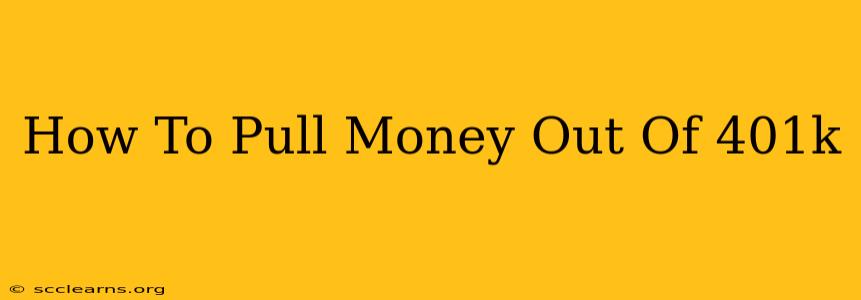Accessing your 401(k) before retirement can feel like a lifeline during financial emergencies, but it's a decision that demands careful consideration. This comprehensive guide explores the various ways to withdraw funds from your 401(k), the tax implications, and the potential long-term consequences. We'll help you understand your options so you can make the best choice for your individual circumstances.
Understanding Your 401(k) Withdrawal Options
Before diving into the specifics, it's crucial to understand that accessing your 401(k) early typically comes with penalties and taxes. The best course of action is to explore all other financial options first. However, sometimes, withdrawing funds becomes unavoidable. Here are the main options available:
1. Hardship Withdrawals
Hardship withdrawals allow you to access your 401(k) funds before retirement age, but only under specific circumstances defined by the IRS. These typically include:
- Medical expenses: Unreimbursed medical expenses for yourself, your spouse, or your dependents that exceed 7.5% of your adjusted gross income (AGI).
- Tuition: Payments for higher education expenses for yourself, your spouse, or your dependents.
- Purchase of a primary residence: Down payment or mortgage payments on your first home.
- Prevent eviction or foreclosure: Payments to prevent the loss of your primary residence.
- Burial or funeral expenses: Costs associated with the death of a close family member.
Important Note: Even hardship withdrawals are subject to taxes and usually a 10% early withdrawal penalty (unless you're over 55 and meet specific criteria). You must also demonstrate a true financial hardship to qualify. Check your 401(k) plan documents for specific eligibility requirements.
2. Loans
Taking a loan from your 401(k) is another option, although it's still a risky one. This allows you to borrow money from your own account, with the loan being repaid with interest.
- Pros: You don't pay any taxes or penalties while repaying the loan. The interest you pay goes back into your 401(k).
- Cons: If you leave your job before repaying the loan in full, it typically becomes due immediately (a tax and penalty situation) or is considered a distribution. It can also reduce your investment growth potential.
3. Early Withdrawal (Generally Discouraged)
This is the least recommended option. Early withdrawal is permitted, but it's usually subjected to significant tax penalties and fees. It's strongly advised to only consider this as a last resort.
- Penalties: Typically a 10% early withdrawal penalty applies, along with your usual income taxes.
- Tax Implications: The amount withdrawn will be added to your taxable income for the year, potentially pushing you into a higher tax bracket.
Minimizing the Tax Impact
Even if a withdrawal is necessary, you can take steps to minimize the tax consequences:
- Consult a Tax Professional: An experienced tax professional can advise on strategies to lessen the tax burden.
- Understand the Tax Implications: Knowing the tax brackets and potential penalties can aid in financial planning.
- Spread Withdrawals: If a significant amount is withdrawn, spreading it over multiple years might lower your taxable income in any given year.
Long-Term Consequences of 401(k) Withdrawals
Withdrawing from your 401(k) before retirement significantly impacts your long-term financial security. Consider the following:
- Reduced Retirement Savings: The most obvious impact is the reduced amount available for retirement.
- Lost Investment Growth: You miss out on the potential for long-term investment growth that compound interest offers.
- Impact on Social Security: Early withdrawals could indirectly affect your Social Security benefits.
Alternatives to 401(k) Withdrawals
Before tapping into your 401(k), explore other financial options:
- Emergency Fund: Having an emergency fund can prevent such situations from forcing you to access retirement funds.
- Personal Loans: These are usually more affordable and have better terms than withdrawing from your 401(k).
- Credit Cards (Use Cautiously): Consider credit cards only for short-term, manageable debt, and ensure you pay it off promptly to avoid high interest.
Pulling money out of your 401(k) should be a last resort. Carefully weigh the immediate needs against the long-term implications before making this crucial decision. Remember to consult with a financial advisor for personalized guidance tailored to your unique financial situation.

